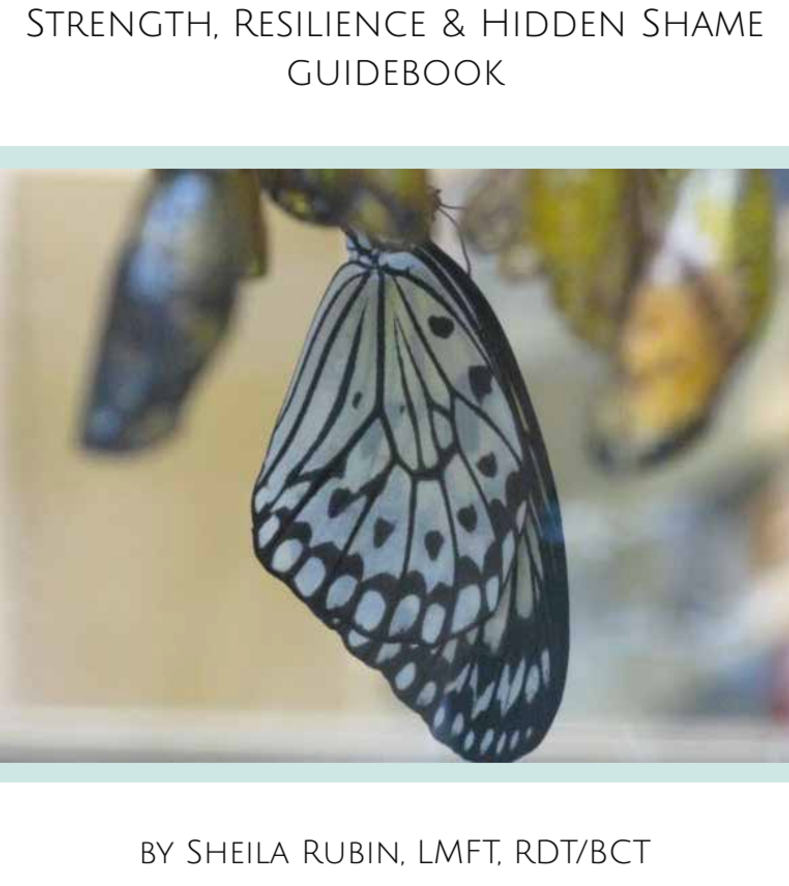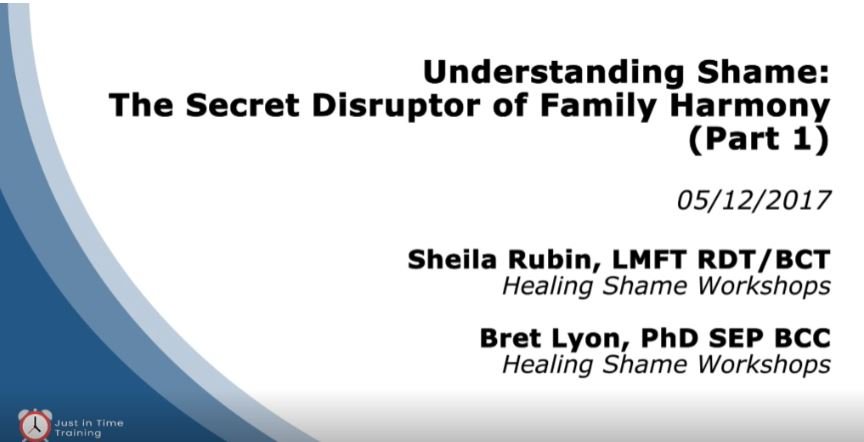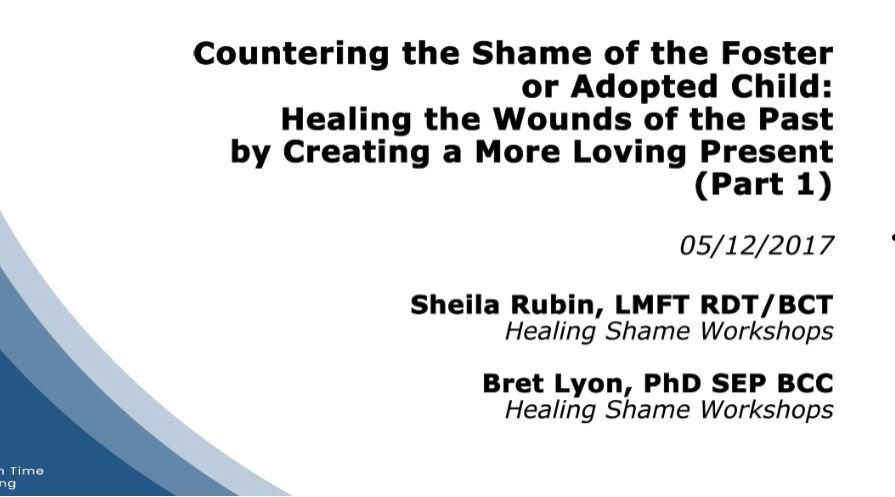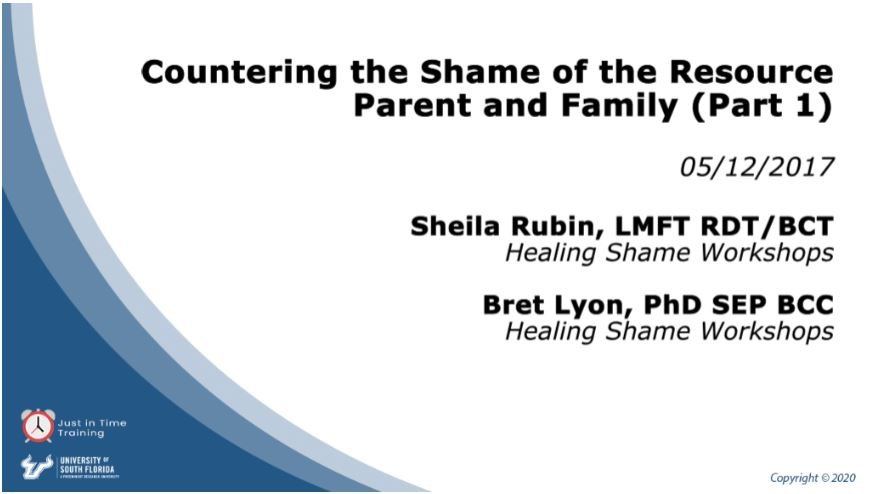Healing Shame Resources –
Audio, Webinars, Reading Lists, Articles and More
HEALING SHAME Audio program
(The only resource listed here that is not free.)
Healing Shame – How to Work with This Powerful, Mysterious Emotion—and Transform It into an Ally
With Bret Lyon & Sheila Rubin
Shame is the most mysterious, painful, and destructive emotion we experience. Yet there is an evolutionary role for this powerful emotion. In Healing Shame, Bret Lyon and Sheila Rubin teach you how to transform toxic shame into healthy shame. Discover how to identify, work with, and ultimately heal shame in our audio learning program. Click here for details.
free PODCASTS
In the podcast “Turning Shame into an Ally,” we speak with Sounds True founder Tami Simon about how we can learn to understand and appreciate shame in a deeper way. This healing conversation covers the different types of shame we encounter, normalizes our experiences of shame, and explores how shame, though painful, can actually be a helpful emotion.
FREE GUIDEBOOK: STRENGTH, RESILIENCE & HIDDEN SHAME
This PDF download includes:
The Resilience Self-Assessment
Tips to identify hidden shame
and proven solutions to transform your:
“Deer in the headlights” freeze-up moments
Explosive outbursts, and
Avoidance tendencies
into healthy responses that will deepen your relationships—even when you are caught off guard by the crazy reactions of others!
Click here to enter your information to get access to the guidebook.
To access our free Healing Shame webinars “Working with Shame” (parts 1 & 2) and our video training “Healing Shame in Individuals and Couples – An Introduction,” please click here to join our email list. Once you sign up, you will receive an email with the link and password to watch the videos. You can unsubscribe from the list at any time.
If you are already on our email list and would like the link and password for the webinars, please email Sheila at sheila@healingshame.com and she will send them to you as soon as she can.
free HEALING SHAME webinars
OTHER WEBINARS AND VIDEOS
“Shame, Trauma, the Nervous System and Coronavirus” – Somatic Experiencing webinar
Shame Clues: From Embarrassment to Breakthrough
TEDxSanRafaelWomen
What if your embarrassment could work for you instead of putting you down? What if you can build from that?
Enjoy Sheila’s talk about the mysterious emotion of shame. Click the photo to watch it on YouTube, or click here to watch it on TED.com.
Healing shame In foster families – videos
“Shame is the intensely painful feeling or experience of believing we are flawed and therefore unworthy of love and belonging.”
–Brown
“Shame is the breaking of the interpersonal bridge.” –Kaufman
“Shame is being seen in a way you don’t want to be seen—the
unbearable exposure of parts of self one doesn’t like.” –Broucek
“Shame is the sudden interruption of pleasure.” –Tompkins
“Shame is a parasympathetic break on excited states—a fast track
physiological response that can overwhelm higher cortical functions.” (Drawn from Porges)
“Shame is a combination of an emotion and a freeze state.”
–Lyon
“Shame is feeling like an outsider—not belonging.”
“Shame is feeling defective. 'There’s something wrong with me.'" –Rubin
"Perfectionism and the inner critic are manifestations of shame." –Rubin
Definitions of shame
Healing Shame Reading List
Shame: The Power of Caring by Gershen Kaufman – The best single book. Short and powerful. John Bradshaw borrowed freely for his popular book Healing the Shame that Binds You. Central concept: Shame is caused by “the breaking of the interpersonal bridge.” I like this better than Kaufman's next book, The Psychology of Shame, because it is more personal.
Shame and the Self by Francis Broucek – A good supplement to Kaufman. Central concept: Shame results from being seen in a way you very much don't want to be seen and/or being seen as an object, not a person. Also, exploration of the shaming quality inherent in most therapy, where one person "needs help" and is prodded to reveal and the other is "the expert" and interprets.
Shame and Pride by Donald Nathanson – A brilliant tome. Describes all of Sylvan Tompkins’ theory of affects—Tompkins' affect theory is the main influence on all of these authors. Very fine work on shame. Available inexpensively (used) on Amazon.
Shame, Exposure and Privacy by Carl Schneider – Schneider, a therapist and minister, looks at the positive importance of shame in a shameless society. Also looks at shaming in therapy.
Shame and Neurosis by Helen Block Lewis – A psychoanalyst, who, in trying to determine why certain patients relapse, writes the first book by a psychoanalyst on the importance of shame. Working with shame also shortens treatment time to about two years instead of six. Some interesting transcripts. Written in the '70s and very expensive used.
Almost Magic: Working with the Shame that Underlies Depression in the Imaginal Realm by Sheila Rubin – This is an excerpt from Sheila's chapter in the book The Use of the Creative Therapies in Treating Depression, edited by Stephanie Brooke and Charles Meyers and published by Charles C. Thomas Publisher.
Shame and Countertransference by Sheila Rubin – This article was published in CAMFT's The Therapist Magazine, volume 28, issue 6. November 2016.
Embodied Life Stories: Transforming Shame Through Self Revelatory Performance by Sheila Rubin – This chapter is from the academic drama therapy book The Self In Performance: Autobiographical, Self Revelatory, and Auto-Ethnographic Forms of Therapeutic Theatre edited by Susana Pendzik, Renee Emunah, and David Read Johnson.
Easier Reading
(For Clients)
Shame and Guilt by Jane Middleton-Moz
and
Letting Go of Shame by Ronald & Patricia Potter-Effron – Both with an excellent list of the different qualities of shame—what it looks and feels like and some simple exercises for the client.
Soul Without Shame by Byron Brown, of the Ridwan School. An excellent book, severely marred by suggesting using willpower to entirely get rid of shame.
I Thought It Was Just Me and The Gifts of Imperfection by Brené Brown – A shame researcher whose TED talk (available on YouTube) went viral, she offers a lot of help around exploring the shaming prevalent in our society and developing resilience, especially for women. Many find both books inspiring and even life-changing.
Books That Shed Light on Shame
Emotionally Focused Therapy for Couples (for therapists) and Hold Me Tight (for clients) by Sue Johnson – Brilliant and clear. Best books about attachment in couples and how emotions work. We never outgrow our need for attachment or our fear of having nobody we can count on when the chips are down. Many people in our society are deeply ashamed of their attachment needs and fears. Her workshop is essential for anyone working with couples.
I Don't Want To Talk About It by Terrence Real – About as "real" as a book can be. Deeply personal as well as clinical. An account of shame and male depression, often expressed in violence.
Kitchen Table Wisdom by Rachel Naomi Remen – Short vignettes from her life and practice. Doesnʼt talk much about shame, but gets at the heart of the powerlessness, emptiness and loneliness that characterize shame—and provides brilliantly counter-shaming spiritual uplift.
The Power of Focusing by Ann Weiser Cornell – A wonderful, practical book on how to work with what may be the most counter-shaming of all therapy techniques. Very useful for therapists and clients. Ann also leads phone trainings in Focusing that, I believe, should be required for every therapist.
The Transforming Power of Affect by Diana Fosha – Perhaps the best single book on how to do effective therapy, but can be very difficult to read. My suggestion is to read the case study first, then start from Chapter 2. It is best if you can supplement the book by taking her immersion course.
Books on
Brain-Mind-Body
Affect Regulation and the Origin of the Self by Allan Schore – The neurological basis of shame and its physiological results. Very difficult reading, but interesting and convincing.
The Developing Mind by Daniel Siegel – Explores the connection between neurology, child-parent affect regulation, attachment theory and adult psychology. Very readable.
A General Theory of Love by Lewis, Amini and Lannon – Short, poetic and inspired book on the brain, affect regulation, attachment theory and relationships. Amazingly profound for such a short book. A good book to suggest to clients.
Waking the Tiger by Peter Levine – Incredibly convincing and readable book comparing human and animal behavior to explore the genesis of and treatment of trauma. Central concept: Trauma is not what happens but how we react to it. Our human socialization prevents us from following the natural process animals use to discharge energy and avoid trauma.








